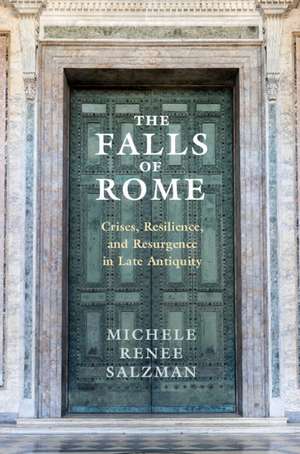The Falls of Rome: Crises, Resilience, and Resurgence in Late Antiquity
Autor Michele Renee Salzmanen Limba Engleză Hardback – 8 sep 2021
Preț: 277.08 lei
Nou
Puncte Express: 416
Preț estimativ în valută:
53.02€ • 55.04$ • 44.21£
53.02€ • 55.04$ • 44.21£
Carte disponibilă
Livrare economică 03-17 martie
Livrare express 15-21 februarie pentru 44.88 lei
Preluare comenzi: 021 569.72.76
Specificații
ISBN-13: 9781107111424
ISBN-10: 1107111420
Pagini: 462
Dimensiuni: 159 x 235 x 32 mm
Greutate: 0.77 kg
Editura: Cambridge University Press
Colecția Cambridge University Press
Locul publicării:New York, United States
ISBN-10: 1107111420
Pagini: 462
Dimensiuni: 159 x 235 x 32 mm
Greutate: 0.77 kg
Editura: Cambridge University Press
Colecția Cambridge University Press
Locul publicării:New York, United States
Cuprins
1. Approaches to the fate of the Late Antique City; 2. The Constantinian compromise; 3. Responses to the sack of Rome in 410; 4. Rome after the 455 vandal occupation; 5. Why Gibbon was wrong; 6. The fall of Ostrogothic Rome and the Justinianic reconstruction; 7. The demise of the senate.
Recenzii
'Michele Salzman's The Falls of Rome does nothing less than re-write the history of the city of Rome in the last centuries of the ancient world. Based on scrupulous attention to evidence of every kind, her account offers a new perspective on almost every aspect of the fate of this vast city and of the remarkable families who rallied again and again to rescue and renew it after every crisis. Here is no story of ineluctable Decline and Fall in the manner of Edward Gibbon, still less of the triumphant absorption of a pagan city by the popes of Rome. Instead, the Roman Senate and its members hold center stage. Seldom has an ancient aristocracy shown such tenacity and such resilience in difficult times. Nor has any recent scholar shown such a gift for conjuring up, from such scattered and easily-neglected evidence, the profile of the distinguished men and women, the emperors and the generals, the grandees and the priests whose dogged defense of the traditions of their unique city imposed their own pace of change on a crisis-ridden age. This is scholarship at its best. The book is a model and a masterpiece.' Peter Brown, Princeton University
'Among the many recent studies of the fall of the Roman Empire, the city of Rome is often understood as the handmaiden to the process of decline and ruin. Michele Salzman's book is the first of its kind to place the ancient capital in proper perspective and, in doing so, breathes new life into exhausted narratives. Meticulously researched and elegantly argued, this book traces the role of the elites at Rome through the dramatic changes of the Empire's last centuries and finds that, in spite of the intimate symbiosis of city to Empire, the leading citizens of Rome were the authors of continued vitality and resilience in the face of repeated disasters. As a scholar of urban and social history, Salzman is exemplary, and The Falls of Rome is destined to become the foundation of future studies of the city for decades to come.' Shane Bjornlie, Claremont McKenna College
'In The Falls of Rome, Michele Salzman offers a gripping account of the disasters that struck the Eternal City between the third and seventh centuries and the efforts Roman senators and bishops made to bring the city back from catastrophe. The city of Rome and the elites who shaped it all come alive as Salzman recounts the multiple crises and recoveries that together demonstrate how Rome's resilience grew out of the dedication of its civic leaders.' Edward Watts, University of California, San Diego
'Who? What? When? Where? Why? Michele Salzman draws on her broad and deep erudition to revisit the whodunnit that is the Roman empire from Constantine to Justinian and a little after. She tracks the sometimes suspicious, often obtuse behavior of the grandly self-absorbed aristocrats of the age to tell a story far richer than mere epic narrative.' James O'Donnell, University of Arizona
'Among the many recent studies of the fall of the Roman Empire, the city of Rome is often understood as the handmaiden to the process of decline and ruin. Michele Salzman's book is the first of its kind to place the ancient capital in proper perspective and, in doing so, breathes new life into exhausted narratives. Meticulously researched and elegantly argued, this book traces the role of the elites at Rome through the dramatic changes of the Empire's last centuries and finds that, in spite of the intimate symbiosis of city to Empire, the leading citizens of Rome were the authors of continued vitality and resilience in the face of repeated disasters. As a scholar of urban and social history, Salzman is exemplary, and The Falls of Rome is destined to become the foundation of future studies of the city for decades to come.' Shane Bjornlie, Claremont McKenna College
'In The Falls of Rome, Michele Salzman offers a gripping account of the disasters that struck the Eternal City between the third and seventh centuries and the efforts Roman senators and bishops made to bring the city back from catastrophe. The city of Rome and the elites who shaped it all come alive as Salzman recounts the multiple crises and recoveries that together demonstrate how Rome's resilience grew out of the dedication of its civic leaders.' Edward Watts, University of California, San Diego
'Who? What? When? Where? Why? Michele Salzman draws on her broad and deep erudition to revisit the whodunnit that is the Roman empire from Constantine to Justinian and a little after. She tracks the sometimes suspicious, often obtuse behavior of the grandly self-absorbed aristocrats of the age to tell a story far richer than mere epic narrative.' James O'Donnell, University of Arizona
Notă biografică
Descriere
Focuses on the resilience of generations of Roman men and women, and their ability to reconstitute their city and society.
